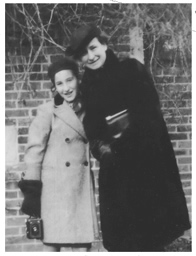by Irene Katzenstein Schmied

Irene Schmied and her mother, who came on a visit to the home of Irene’s foster parents England, winter of 1939-1940
Our Kindertransport group had arrived in Hamburg in time for lunch at a Jewish Domestic Science School. By afternoon, a bus drove us through the streets of the town to the port. I glued my nose against the window and watched the walls of buildings along the street go by and the electrical trolleys glide past on their snow-covered tracks. Their bells tingled whenever they stopped to let off people.
I turned to Marianne next to me. Did she have any idea where the bus was taking us? To keep the thoughts about my parents at bay, I tried to ask her why her father had not been at the station that morning. The right words would not come.
“Your Pappi,” I stuttered. “Is he at home?”
“Er lebt nicht mehr.” (He no longer lives.)
She began pulling, almost tearing, at the identification tag hanging around her.
Even as I heard those words, so unfathomable to me then, there was a vague understanding of them deep within me. Years later, when we came across one another as adults in New York, Marianne would tell me of the shot that had rung out one evening shortly before New Year 1939. The Gestapo had come back to fetch her father even though he had only just been released—his head shorn, his face gaunt, his eyes circled with pain. Detained on Kristallnacht, he had spent a month in Sachsenhausen, a concentration camp near Berlin. Then he heard them pounding at the front door again. He could bear it no more, and had raised his gun to his temple.
In the bus that evening, I could find nothing to say to her. The words “lebt nicht mehr” echoed almost meaninglessly in my mind. I forced myself to look out of the window at the street outside. The row of shops along it sent its yellow light out into the dusky air and onto the snow-swept sidewalks. On this as on any other late January evening, people stopped to point at the winter sales displayed in the windows. Did they know what was happening?
Finally the bus stopped in front of a long, low brick building. Brown-shirted border guards stood at the entrances. The light streaming out of the barred windows hit my face. It sharpened the pain above my left eye. The rabbit charm in my pocket—a gift from my grandmother—began to tingle between my fingertips. Leaving the bus, I pushed myself forward to keep up with the others.
Instructions blared over the loudspeaker and innumerable lamp bulbs on the long stretch of low white ceiling blazed down. My suitcase grew heavier as I inched my way toward the rows of officials seated behind long wooden tables.
The voices, the rustling of paper, the smell of dust and perspiration were dizzying. The glare of the naked lights hit my forehead and prevented me from keeping up with Lottie, the social worker in charge, and the other children. Leaning against a nearby doorway, I waited for the pounding in my forehead to pass.
Opening my eyes again, I stepped into another place in the file. It was not the same line. A group of middle-aged couples surrounded me. Where had the other children gone? Alarmed, I thought of my parents. Would they be here? Were they still at home? I must find a telephone, to call them up, make sure that they were all right. The image of Marianne’s father hit my mind.
The gruff voice of the official at the table jolted me back. “What is this child doing here?”
The people in the line turned to stare. I felt hedged in by a circle of questioning, anxious faces. They were all strangers.
The official turned to an assistant. I heard him say, “Get this child out of the way!”
The pain in my head seemed to burst. I took the rabbit charm out of my pocket and squeezed it for comfort. It was turning into a pulsating lump. The two customs officials were staring right at it.
A heavy tap on my shoulder sent a quiver through me and the rabbit plummeted to the floor. Not daring to pick it up, I turned my head, and found myself staring at the yellow scarf around Lottie’s neck. She seemed ready to slap me. Instead she shook me by the shoulders.
“Come on, you should be over there with all the others on the Kindertransport line.”
I held back and stooped to search for the little rabbit. I could not just abandon it amidst the dust, scraps of papers and cigarette ends that littered the floor. It was Lottie who saw its glimmer, scooped it up and handed it back to me, saying “Come on now, put away that silly little trinket. Let’s go!”
The rabbit in my hand once more, I saw how tiny it really had been all the time. I stowed it in my coat pocket, knowing that it was safe now. Taking Lottie’s hand, I followed her into the right line.
The smell of the sea drifted towards us as we threaded our way through the crowd. In front of us, a wall of lighted portholes of the vessel stretched into the dark sky. I drew back. It seemed as if a row of huge Berlin apartment houses had floated down the river in pursuit. Or was this still Berlin? Had I never left? Willing them to turn back into the shining portholes of the steamer, I stared hard at the cold bright lights. Then I grasped the railing, and let the gangway pull me up into the ship.